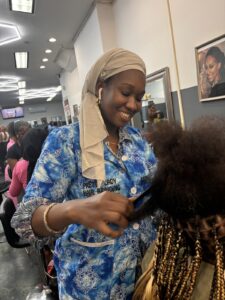Business Featured Articles
Braiding hair, for cash and culture
 By Kelsi Bowen
By Kelsi Bowen
A woman with brown micro-locs sat in the second of eight chairs stretching from the door to the back wall of Latifa Natural Hair Salon. The woman wore a multi-colored orange, yellow, red, blue and green silk chiffon maxi dress she had made in Senegal, where she was born. Oval-shaped, faux gold earrings hung from her earlobes.
That – – – – cray. That – – – – cray …
Those lyrics from Kanye West and Jay-Z were blasting in the background, but the woman, Fatoumata Mbaw, remained centered and concentrated on the work in front of her.
“Braiding is like creating,” Mbaw said. “You’re making people look beautiful, and I like that. I like making my women look very pretty.”
By that, she meant the Black women whose hair she has been braiding for more than 20 years. Her journey to this work was immersive and accidental.
“I was one of eight siblings. I had sisters. My mom didn’t know how to do hair, so I was the only one who could really do my sisters’ hair.” She kept practicing and developed a love for doing hair., a love she brought with her when, with her husband, she traveled 3,800 miles across an ocean to America.
Back home, Mbaw did hair for free and out of necessity. In the United States, she began to get paid for her skills. “I saw that Black women really liked to look pretty. I said to myself,‘ I know how to do this, so let me just embrace it.’ ”
Down the block–322 feet, by Google Maps–from Latifa’s is Pretty Lady African Hair Braiding. Inside, the braiders and their clients were chatting each other up and laughing. Teenage girls giggled as they practiced braiding on mannequins. Nollywood films hummed from a flat screen TV in the background.
At their busiest, there are 15 braiders at work, every station stretching from the doors to the Barber Shop in the back is in use. The salon owner, Racky Ly, is three chairs down on the right from the doors. She looks up at the open door, smiling.
Born in Mali and raised in Senegal, Ly started braiding hair when she was about 14. Like Mbaw, she began braiding as a business when she came to America with her husband in 2000.
She came here when she was about 35 and has been braiding ever since. “ Since then I’ve been here doing hair. Nothing else, just hair.”
In her 22 years of braiding, she has seen the comings and goings of styles.
Her younger customers prefer knotless braids and colored extensions to traditional box braids. She adapted to the modern styles but doesn’t think there’s much of a difference between styling hair back then and now.
Compared to when she started, many customers are now more concerned with how hair services affect their hair health. One main concern is the amount of tension used while weaving synthetic hair into their natural hair.“Now we know better. Before people used to say, ‘Do my hair in … small braids.’ Now, people don’t want to do the small braid [because] most of the time your hair comes out.”
While she won’t refuse the style if a client requests it, Ly warns them of the risks.
Twenty-two years ago, it was just her. Now, she has 10 to 15 people braiding with her. “The people who want to work and feel like they want to work, they are here,” she said. She also allows young braiders to braid in her shop: “ I teach them also. Like she,” Ly said, her open palm gesturing to a woman on her right, “doesn’t know how to do hair, but she can braid ends later on in, maybe, five months.”
Fatoumata Mbaw and Racky Ly both express hope for the next generation of hair braiders. However, they do carry advice for the ones coming after them:
Mbaw’s advice: ” Younger braiders are very talented but use less natural products and too many chemicals. Let’s be more conscious about what products we apply to our scalp.”
Ly’s advice: “ Be focused, be patient with your customers, and be respectful. Being respectful can get you anything in life.”

